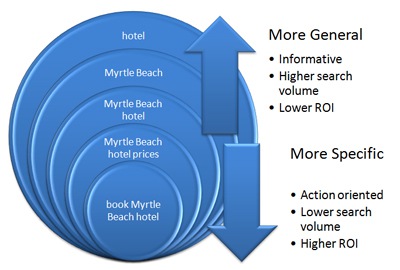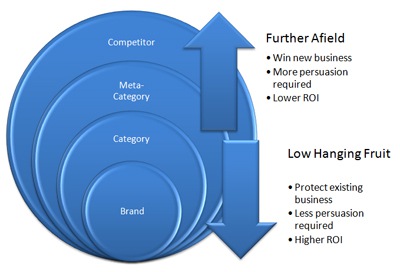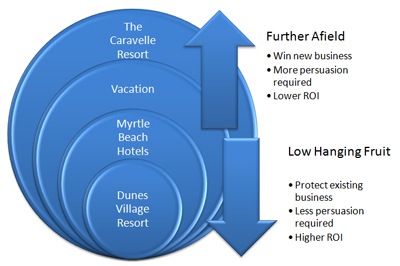We could call it Target Market Proximity, ROI Proximity, or Persuasive Distance. How closely your offering fits the search query comes heavily into play in terms of:
- Choosing keywords
- Grouping keywords
- Writing ad copy
- Choosing and creating landing pages
- Defining target/acceptable KPI’s
Low Hanging Fruit Keywords vs. Further Afield Keywords
Some keywords are slam dunks. They’re high volume, “head” (not long-tail) keywords, and people who are searching for them want what you have to offer. They produce great ROI. They’re the low hanging fruit.
Other keywords are a little or a lot further off the trail. It takes more clever advertising to direct people from those searches to what you offer. It may require a persuasive landing page. You have further to go from where the searcher is at psychologically to where they’re buying what you’re selling.
Action-Oriented Keyword Selection
The first way to think about this in terms of searcher intent is what action are they wanting to engage in.
If you’re booking hotel rooms in myrtle beach, the guy that’s searching for “book myrtle beach hotel room” is just who you’re looking for.
In order of low hanging fruit to more difficult to sell would be:
- “book myrtle beach hotel room” – they’re ready to book
- “myrtle beach hotel prices” – comparing prices
- “myrtle beach hotel” – interested in the type of offering
- “myrtle beach” – interested in your destination
- “hotel” – interested in staying somewhere, anywhere
When someone is first thinking about Myrtle Beach as a destination, they search for “myrtle beach”. Once they’re thinking about really staying, they search “myrtle beach hotel”. If they’re comparing prices, “myrtle beach hotel prices”. When they’re ready to book they might search “book myrtle beach hotel”.

The important info for the PPC marketer is what are the search volumes, ROI, and extra work required for conversion at each stage.
Those are only intent keywords. As you might guess, there’s another level- because many people search for hotels by hotel name or national chain brand name.
Focus-Oriented Keyword Selection
The next way of looking for low or high hanging fruit is in terms of how specifically the searcher is looking for you, as opposed to your category, competitors, or larger categories.

Above is the general view of this framework.
Here’s a more specific example:

Approaches to Searcher Focus Keywords
Brand Keywords, e.g. “Dunes Village Resort”
These are the lowest hanging fruit. Someone is already searching for your offering. ROI is super high and so is conversion rate. We regularly see ROAS of 1000% or greater in these campaigns.
Some clients debate whether they would get these sales anyway without PPC. Several third-parties (iCrossing, and Compete.com) have done research that demonstrates the extra traffic and sales people get from doing PPC and SEO simultaneously for the same keywords. And PPC is stronger than SEO at warming up the sale. Ad copy can have a powerful effect on conversion rate and average sale. You can’t do that with SEO.
Category Keywords, e.g. “Myrtle Beach Hotels”
This is a good place to win new business. It’s harder, because you have to have a strong offer or benefit, and ROI may be lower (200-500% ROAS), but keep in mind the lifetime value of a new customer. You may have just won a competitor’s former customer, and you often get their permission to continue to market to them for months or years after the first sale.
Meta Category, e.g. “Vacations”
This is clearly more difficult. You have to sell them on your category AND your brand. But if you find a strong offer or selling technique, it’s another place to pull in more new business.
Competitor, e.g. “The Caravelle Resort”
This is harder than the meta-category, because someone is already thinking about your specific competitor. Just getting attention here can be difficult- that’s the job of your ad copy, and if your CTR from that is too low, CPC shoots up and you’ll never get great ROI.
You need a killer competitive advantage, offer, or incentive. You need to create a landing page that spells out the differences between you and your competitor. One ethical approach is to point out that although your competitor is good for some people, other people with other needs would do better with your product. Spell out who those people are, what those needs are, and show how you meet them while the competitor does not.
Brian Carter is the Director of Search Engine Marketing for Fuel Interactive, an interactive marketing agency in Myrtle Beach, South Carolina. He is responsible for the SEO, PPC, SMM, and ORM programs at Fuel and its partner traditional agency Brandon Advertising & PR.




